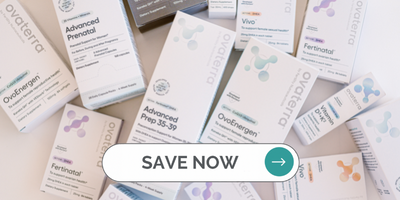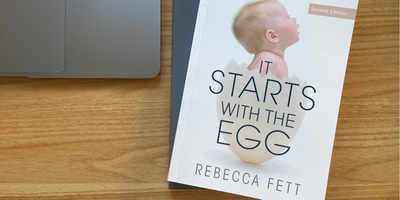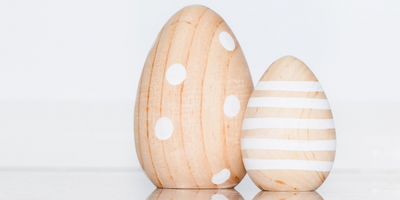What are postnatal vitamins?
Everyone knows what prenatal vitamins are, but what are postnatal vitamins? Postnatal vitamins are multivitamins designed to support the health of the mom and baby after birth.
The time after birth is challenging, to say the least. The mom’s body is trying to recuperate from the 39+ weeks of pregnancy and delivery, while taking care of the new baby, sleep-deprived. Postnatal vitamins, if designed properly, can be a great tool help the mom recover and deliver the much-needed nutrients to the baby through breastmilk.
Are postnatal vitamins and prenatal vitamins different?
Ingredients in postnatal vitamins are similar to those in prenatal vitamins. Depending on the brand, postnatal vitamins may have different ingredients from prenatal vitamins, or the same ingredients in different doses.
Which vitamins and minerals do you need more of, when breastfeeding?
When breastfeeding, your daily requirements for some vitamins and minerals actually increase, compared to during pregnancy. There are 3 major nutrients you need more of in your postnatal period:
- Vitamin A: 1,300 mcg RAE when breastfeeding, up from 770 mcg RAD when pregnant
- Choline: 550 mg when breastfeeding; up from 450 mg when pregnant
- Iodine: 290 mcg when breastfeeding; up from 220 mcg when pregnant
You also need more trace (but essential) minerals like zinc, selenium, manganese and chromium when you are breastfeeding, vs. pregnant.
Why do moms take postnatal vitamins after birth?
Healthy, varied diet for the mom is the foundation of postnatal health for both the mom and baby, but it can be challenging to get all the necessary postnatal nutrients from diet alone. Postnatal vitamins can be a powerful tool to bridge that nutritional gap.
Here are 5 major areas where postnatal vitamins can help the mom and baby.
1) Baby’s brain continues to develop after birth.
- Brain structure and cognitive functions: Choline, a building block of nerve cells, helps the baby’s brain develop further after birth. It’s also a component of an important neurotransmitter, called acetylcholilne, which facilitates memory, mood regulation and other functions of the brain. Getting 550 mg of Choline while breastfeeding can be difficult (that’s more than 3 eggs a day), but it’s important to support the baby’s cognitive development.
- Thyorid hormones: The two thyroid hormones (T3 and T4) play a key role in the baby’s brain development during pregnancy, and this continues after birth. When breastfeeding, your need for Iodine, a building block of these hormones, go up to 290 mcg. Of course, Iodine, along with Selenium, also helps the mom maintain healthy thyroid hormone levels.
2) Baby’s immune system forms and develops.
- Babies are born with the mom’s antibodies that protect them from infections in the first months of life. After that, though, babies have to develop their own immune system. Nutrients like Iodine, and Zinc, as well as Vitamins A, C and D help the baby develop a strong immune system.
3) Baby's continued development relies on breastmilk.
- Organ development & milk production: Babies are born with low Vitamin A reserve and need it from diet for healthy vision and further development of organs, including the brain, eyes, heart and more. Studies suggest that a sufficient level of Vitamin A in the mom may facilitate breastmilk production, too.
- Metabolism & growth: Although scientists don’t yet know why, at least one in three breastfeeding moms develop a mild biotin deficiency, even with adequate dietary intake of Biotin. This B vitamin is essential for the body to metabolize all three macronutrients, and as such, necessary for the baby’s growth.
4) Mom needs to recover.
- Blood: Typically, women lose about 500 ml of blood during vaginal birth and up to 1 liter in a Cesarean delivery – about 8-15% of the total blood. To replenish the lost blood, the mom’s body needs Iron. Interestingly, another mineral – Copper – is also necessary to absorb Iron and incorporate it into hemoglobin in the red blood cells. (Note: Most women in the US get enough iron from diet and don’t need a ton of iron in postnatal vitamins. If you are anemic, or feel unusually tired, ask your doctor to monitor your iron levels so you can take action.)
- Bones & teeth: If the Calcium intake wasn’t adequate during pregnancy, the baby may have taken Calcium from the mom’s bones and teeth to build its own. This process weakens the mom’s bones and teeth. To build them back up, Calcium and Vitamin D are key during the postnatal period.
5) Mom needs energy and sleep.
- Energy metabolism: We know – from our own experience and what we hear from the Ovaterra community – that moms run on depleted tanks in the postnatal period. B vitamins like Vitamins B6 and B12 are key to supporting new moms. Involved in the metabolism of macronutrients, cell repair and DNA synthesis, B vitamins support moms stay energized to take on each day.
- Sleep: All new parents are sleep-deprived. (No, that doesn’t help the energy situation, either.) Studies have found that Selenium can support healthy sleep (including ease of falling asleep and sleep duration). Helpfully, healthy levels of this trace mineral, along with Zinc, has also been suggested as potentially important for mood regulation.
Are there anything else a breastfeeding mom should take, on top of postnatal vitamins?
Omega-3 fatty acid (primarily DHA and EPA) may be a good addition to postnatal vitamins. Some brands come with Omega-3 already included, while others don’t. Omega-3 fatty acids, also called the “healthy fats,” play multiple physiological roles, in both the mom and baby, but a key factor in the months after birth is their role in the baby’s neural and cognitive development.
Especially if you follow a vegetarian or vegan diet, which is a risk factor for low Omega-3 levels, taking an Omega-3 supplement may be a good idea while nursing.
How long should you take postnatal vitamins?
Our scientific team recommends all postnatal moms to take postnatal vitamins for at least 3 months, but ideally for 6 months after birth. If you are breastfeeding (including pumping), it’s best to stay on postnatal vitamins until your baby is weaned, so that the breastmilk can support the growing nutritional need of the baby, while you stay nourished, too. That’s the recommendation of the World Health Organization as well.
Can you take your favorite prenatal vitamins after birth?
Prenatal vitamins and postnatal vitamins can be quite similar in ingredients, so, yes, you can continue to take your favorite prenatal vitamins after you give birth. If you use your prenatal vitamins as postnatal vitamins, just make sure that your prenatal vitamins contain enough Choline, Vitamin A, Iodine, Selenium, Zinc and a few key postnatal nutrients to bridge any gap you might have in your diet.
For example, many prenatal vitamins only contain around 100 mg of Choline, which may not be enough to meet the 550 mg/day requirement for nursing moms, depending on what your diet is like. Unless you routinely eat 2-3 eggs (which contain 300-450 mg of Choline) per day, 100 mg of Choline is likely insufficient in a postnatal vitamin supplement.
Takeaway on postnatal vitamins
- Postnatal vitamins are similar to prenatal vitamins, but the type and amount of nutrients different. Postnatal vitamins should be designed to support the unique needs of the breastfeeding mom and the baby after birth.
- Look for Vitamin A, Choline, Iodine, Selenium, Zinc and other key postnatal vitamins and minerals when choosing yours.
- You can continue to take your favorite prenatal vitamins as postnatal vitamins.
- Doctors recommend staying on your postnatal vitamins for 3-6 months after birth, or until your baby is weaned if you are breastfeeding.
Please reach out if you have need any help figuring out if you need postnatal vitamins, how to choose one that's right for you, and more. We are with you.
Ovaterra provides reproductive health resources for general, educational purposes only. This content is not intended to replace medical advice from a qualified healthcare professional. Similarly, when making your financial decisions, please consult qualified financial professionals who can make individual recommendations.









